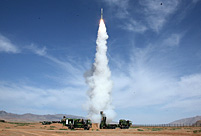The super victory for German Chancellor Angela Merkel and her party on Sunday has secured a third term for the respected female leader.
More than that, the continuation of her chancellorship in the coming four years is very likely to guarantee the good and strong momentum of development of China-Germany relations and forge closer ties.
Merkel, in her two four-year terms, has shelved minor differences that may thwart the development of bilateral ties, focused more on issues of common concern, and repositioned her China policies, offering lessons and examples to the whole Europe.
Merkel's tactics, in large part, are attributable to the ever increasing interdependence and connectivity between the European economic powerhouse and China, its strategic partner in the emerging market.
Germany has been China's biggest trading partner and largest source of foreign investment and technologies in Europe, while China has offered a huge market for German businesses.
Official figures showed the two-way trading volume of goods last year stood at 161 billion U.S. dollars, amounting to around one third of the grand total between China and the European Union.
Amid the European debt woes and the financial turmoil, Germany embraced opportunities brought about by the strong Chinese economic growth, instead of taking strategies of confrontation in dealing with trade disputes.
China and Germany, both world leaders in exports, have common interests in advocating free trade, combating protectionism and creating a level playing field for businesses to achieve win-win outcomes.
As China's ambassador in Berlin Shi Mingde put it when Chinese Premier Li Keqiang visited Germany in May, "pragmatic cooperation between Germany and China is playing a leading role in China-EU relations."
In June, Germany's active involvement in settling a trade dispute over exports of Chinese-made solar panels to the EU helped work out a negotiated resolution, avoiding outbreak of a trade war.
Such pragmatic cooperation is also marked by frequent exchanges of visits and contacts of the two countries' leaders.
Before Premier Li's official visit, former premier Wen Jiabao paid six visits to Germany in total and initially launched China-Germany intergovernmental consultation mechanism.
In return, Merkel also visited China six times, making her one of the foreign leaders who paid most visits to the old Oriental country.
The re-election of the popular chancellor, who actually unleashed the huge potential of reciprocal cooperation between the two big economies, would increase the chances of maintaining the stable climate for accelerated development of China-Germany ties.
Moreover, an ever-growing Sino-German cooperation will in turn bring broader prospects for China-EU relationship.
 Storms leave 97 dead, 58 missing in Mexico
Storms leave 97 dead, 58 missing in Mexico New model of indigenous surface-to-air missiles testfired
New model of indigenous surface-to-air missiles testfired  118.28-carat diamond to be auctioned in HK
118.28-carat diamond to be auctioned in HK Maternal love under streetlight
Maternal love under streetlight Naked foreign student sits in the middle of a road in Haikou
Naked foreign student sits in the middle of a road in Haikou  Colorful Yunnan: Enjoy the natural beauty
Colorful Yunnan: Enjoy the natural beauty Harbin named Chinese city with most beautiful women
Harbin named Chinese city with most beautiful women New college students' military training in Guangzhou
New college students' military training in Guangzhou Rugby girls
Rugby girls PLA's 38th Group Army conduct training
PLA's 38th Group Army conduct training Residences of the royal house of Savoy
Residences of the royal house of Savoy The last days of Wan Aihua
The last days of Wan Aihua Highlights at 12th National Games of China
Highlights at 12th National Games of China Beijing Film Academy welcomes freshmen
Beijing Film Academy welcomes freshmen Large mahjong party sets new world record
Large mahjong party sets new world recordDay|Week|Month